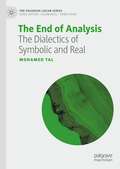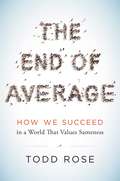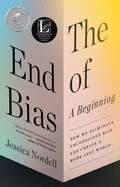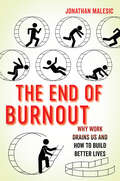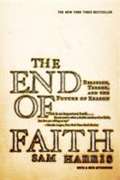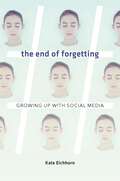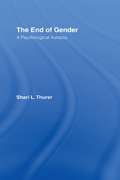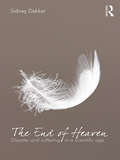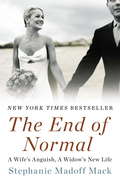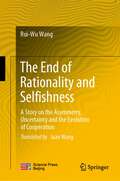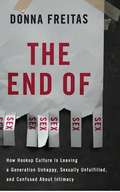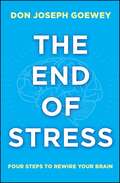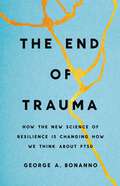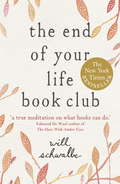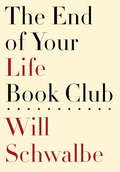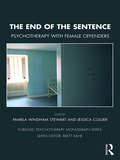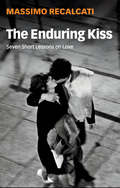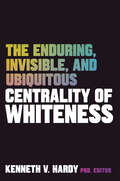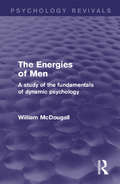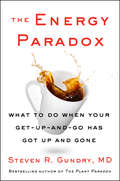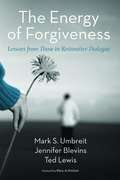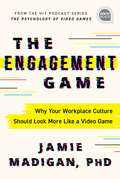- Table View
- List View
The End of Analysis: The Dialectics of Symbolic and Real (The Palgrave Lacan Series)
by Mohamed TalThis book interrogates the “end of analysis” in psychoanalytic thought from Freud to Lacan. It demonstrates that the notions of mourning, renunciation, liquidation of transference, and traversal of fantasy cannot serve as a settlement for the castration complex (i.e., central to neurosis) but are rather prey to the castration complex itself. It shows how psychoanalysis remains incomplete as long as it has not surpassed them as fantasies sustained by psychoanalytic ideology. In other words, it argues that the analytic procedure must pull psychoanalysis out of this therapeutic tradition for it to be complete and to instigate an attempt of its renewal.The book equally revisits Freud’s and Lacan’s underpinnings in the Enlightenment project, in order to formulate the problem of transference on proper dialectical foundations—that is, the mechanism of alienation from Descartes to Hegel, Kierkegaard’s concept of anxiety, as well as the concepts of authority and value in Durkheim, Mauss, and Marx. In doing so, it provides fresh insights that will appeal to practitioners, as well as to scholars of psychoanalysis and philosophy.
The End of Average: How We Succeed in a World That Values Sameness
by Todd RoseAre you above average? Is your child an A (or a C) student? Is your employee an introvert or an extrovert? Every day we are measured against the yardstick of averages, judged according to how closely we resemble it or how far we deviate from it. The assumption that metrics comparing us to an average--like development milestones, GPAs, personality assessments, standardized test results, and performance review ratings--reveal something meaningful about our potential is so ingrained in our consciousness that we rarely question it. That assumption, says Harvard's Todd Rose, is spectacularly--and scientifically--wrong.In The End of Average, Rose shows that no one is average. Not you. Not your kids. Not your employees or students. This isn't hollow slogan-eering--it's a mathematical fact with enormous practical consequences. But while we know people learn and develop in distinctive ways, these unique patterns of behaviors are lost in our schools and businesses which have been designed around the mythical "average person." For more than a century, this average-size-fits-all model has ignored our individuality and failed at recognizing talent. It's time to change that.Weaving science, history, and his experiences as a high school dropout, Rose brings to life the untold story of how we came to embrace the scientifically flawed idea that averages can be used to understand individuals and offers a powerful alternative: the three principles of individuality. The jaggedness principle (talent is never one- dimensional), the context principle (traits are a myth), and the pathways principle (we all walk the road less traveled) help us understand our true uniqueness--and that of others--and how to take full advantage of individuality to gain an edge in life.This powerful book will forever change how you see averages and talent.Praise for The End of Average " Todd Rose shows that everything we think we know about 'average' performance is wrong. In fact, our one-dimensional understanding of achievement--our search for the average score, average grade, average talent--has seriously underestimated human potential. This book is readable, enlightening, and way above average."--DANIEL H. PINK, author of To Sell Is Human and Drive " Fascinating, engaging, and practical. Todd Rose dispels the myth that our success can be divined by a simple number or average, whether a grade, a score in a standardized test, or a ranking at work. The End of Average will help everyone--and I mean everyone--live up to their potential."--AMY CUDDY, professor at Harvard Business School and author of Presence" Todd Rose has achieved a rare feat: he is both provocative and right. He overturns our fundamental assumptions about talent, and offers an empowering way to re-think the world. With exciting stories, fresh data, and bold ideas, this book is far better than average."--ADAM GRANT, Wharton professor and New York Times bestselling author of Give and Take and Originals " Consistently mind-blowing!"--Dan Heath, coauthor of the New York Times bestsellers Made to Stick, Switch, Decisive" Todd Rose's thought-provoking book challenges the explanatory power of the everyday term 'average,' opening our minds to new ways of conceptualizing human variation and human potentials."--HOWARD GARDNER, author of Truth, Beauty, and Goodness Reframed " In the midst of a war for talent, we miss huge opportunities to find it. This stunning book shows how almost all the measures we use reduce complicated individuals to one-dimensional beings. As a result, we overlook how talent, context, and disposition fold together to create individual uniqueness. I couldn't put this book down."--JOHN SEELY BROWN, independent cochair of Deloitte's Center for the Edge and coauthor of The Social Life of Information, The Power of Pull, and The New Culture of Learning
The End of Bias: The Science and Practice of Overcoming Unconscious Bias
by Jessica NordellThe End of Bias is a transformative, groundbreaking exploration into how we can eradicate unintentional bias and discrimination, the great challenge of our age.Unconscious bias: persistent, unintentional prejudiced behavior that clashes with our consciously held beliefs. We know that it exists, to corrosive and even lethal effect. We see it in medicine, the workplace, education, policing, and beyond. But when it comes to uprooting our prejudices, we still have far to go.With nuance, compassion, and ten years' immersion in the topic, Jessica Nordell weaves gripping stories with scientific research to reveal how minds, hearts, and behaviors change. She scrutinizes diversity training, deployed across the land as a corrective but with inconsistent results. She explores what works and why: the diagnostic checklist used by doctors at Johns Hopkins Hospital that eliminated disparate treatment of men and women; the preschool in Sweden where teachers found ingenious ways to uproot gender stereotyping; the police unit in Oregon where the practice of mindfulness and specialized training has coincided with a startling drop in the use of force.Captivating, direct, and transformative, The End of Bias: A Beginning brings good news. Biased behavior can change; the approaches outlined here show how we can begin to remake ourselves and our world. Includes illustrated charts
The End of Burnout: Why Work Drains Us and How to Build Better Lives
by Jonathan MalesicGoing beyond the how and why of burnout, a former tenured professor combines academic methods and first-person experience to propose new ways for resisting our cultural obsession with work and transforming our vision of human flourishing. Burnout has become our go-to term for talking about the pressure and dissatisfaction we experience at work. But because we don’t really understand what burnout means, the discourse does little to help workers who are suffering from exhaustion and despair. Jonathan Malesic was one of those workers, and to escape he quit his job as a tenured professor. In The End of Burnout, he dives into the history and psychology of burnout, traces the origin of the high ideals we bring to our dismal jobs, and profiles the individuals and communities who are already resisting our cultural commitment to constant work. In The End of Burnout, Malesic traces his own history as someone who burned out of a tenured job to frame this rigorous investigation of how and why so many of us feel worn out, alienated, and useless in our work. Through research on the science, culture, and philosophy of burnout, Malesic explores the gap between our vocation and our jobs, and between the ideals we have for work and the reality of what we have to do. He eschews the usual prevailing wisdom in confronting burnout ("Learn to say no!" "Practice mindfulness!") to examine how our jobs have been constructed as a symbol of our value and our total identity. Beyond looking at what drives burnout—unfairness, a lack of autonomy, a breakdown of community, mismatches of values—this book spotlights groups that are addressing these failures of ethics. We can look to communities of monks, employees of a Dallas nonprofit, intense hobbyists, and artists with disabilities to see the possibilities for resisting a "total work" environment and the paths to recognizing the dignity of workers and nonworkers alike. In this critical yet deeply humane book, Malesic offers the vocabulary we need to recognize burnout, overcome burnout culture, and find moral significance in our lives beyond work.
The End of Faith: Religion, Terror and the Future of Reason
by Sam HarrisAn analysis of the clash between reason and religion in the modern world, calling for a foundation for ethics and spirituality that is secular and humanistic.
The End of Forgetting: Growing Up with Social Media
by Kate EichhornThanks to Facebook and Instagram, our younger selves have been captured and preserved online. But what happens, Kate Eichhorn asks, when we can’t leave our most embarrassing moments behind? Rather than a childhood cut short by a loss of innocence, the real crisis of the digital age may be the specter of a childhood that can never be forgotten.
The End of Gender: A Psychological Autopsy
by Shari L. ThurerGender isn't what it used to be. Categories are collapsing. What was deviant for baby boomers has become mainstream for their offspring: like the coed who realizes she's bisexual but, after a period of adjustment, shrugs her shoulders and gets on with her otherwise mundane life. Gender as we once understood it is over, and gender-bending is the new beat. Men sport ponytails and earrings and teach nursery school; women flaunt tatoos and biceps and smoke cigars.In The End of Gender, Shari L. Thurer argues that we are in the midst of a new sexual revolution. It is one where gender categories are blurring not just at the "fringes" of society, but in mainstream lifestyle, media, fashion, and art. So, why is this cultural phenomenon happening now? And what does it mean? In lively, non-technical language, and with sometimes surprising case studies from her 25 years as a psychologist, Thurer answers these questions, bridging complex postmodern theory with cutting edge psychoanalysis.
The End of Heaven: Disaster and Suffering in a Scientific Age
by Sidney DekkerIn this unique book, Sidney Dekker tackles a largely unexplored dilemma. Our scientific age has equipped us ever better to explain why things go wrong. But this increasing sophistication actually makes it harder to explain why we suffer. Accidents and disasters have become technical problems without inherent purpose. When told of a disaster, we easily feel lost in the steely emptiness of technical languages of engineering or medicine. Or, in our drive to pinpoint the source of suffering, we succumb to the hunt for a scapegoat, possibly inflicting even greater suffering on others around us. How can we satisfactorily deal with suffering when the disaster that caused it is no more than the dispassionate sum of utterly mundane, imperfect human decisions and technical failures? Broad in its historical sweep and ambition, The End of Heaven is also Dekker's most personal book to date.
The End of Normal
by Stephanie Madoff MackA New York Times bestseller, the explosive and heartbreaking memoir from the widow of Mark Madoff and the daughter-in-law of Bernard Madoff When the news of Bernard Madoff’s Ponzi scheme broke, no one was more shocked than the members of his own family. Before then, Madoff’s son, Mark, and daughter- in-law, Stephanie, had built an idyllic life. Yet, while Mark’s thriving business was entirely separate from his father’s now notorious fund, he and Stephanie found themselves in the eye of the storm—and grappling with their own sense of betrayal. Mark refused to see or speak to his parents, and on the second anniversary of his father’s arrest, he hanged himself. Left to raise her children as a single mother, Stephanie tells the real story of her marriage to Mark, of being a part of the Madoff family, and of life for two years following her father-in-law’s arrest and incarceration. The End of Normal is a searing inside look at one of the most controversial stories of our time, and an extraordinary memoir of surviving personal tragedy amid public scandal. .
The End of Normal: A Wife's Anguish, A Widow's New Life
by Stephanie Madoff Mack Tamara JonesAn explosive, heartbreaking memoir from the widow of Mark Madoff and daughter-in-law of Bernard Madoff, the first genuine inside story from a family member who has lived through -- and survived -- both the public crisis and her own deeply personal tragedy. Stephanie Mack, the daughter-in-law of Bernie Madoff, share's her life story. Bernie scammed many Americans, but Stephanie and her husband knew nothing about his activities. Still his actions had a devistating impact on Stephanie, her husband, and her children.
The End of Rationality and Selfishness: A Story on the Asymmetry, Uncertainty and the Evolution of Cooperation
by Rui-Wu WangThis book reviews the antinomy of rationality and selfishness raised from egoism, though rationality and selfishness are understood as basic evolutionary dynamics of humans and other organisms in both classical economics and evolutionary biology. Based on the research and a comparison with human’s social cooperative behavior, the author presents his belief that the social cooperative system, in its essence, cooperation and conflict are of uncertain stochasticity resulting from their intrinsic asymmetric interaction between cooperative partners. The book then discusses limitations of Newton’s methodology of monism in both biology and social science. The understanding of the asymmetric and uncertain characteristics found in cooperation system needs perspective of quantum physics of pluralism. At the end of the book, the author undertakes a review of consistency of Newtonian and monism philosophy and the links between quantum physics and pluralism philosophy.
The End of Sex: How Hookup Culture is Leaving a Generation Unhappy, Sexually Unfulfilled, and Confused About Intimacy
by Donna FreitasHookup culture dominates the lives of college students today. Most students spend hours agonizing over their hopes for Friday night and, later, dissecting the evenings’ successes or failures, often wishing that the social contract of the hookup would allow them to ask for more out of sexual intimacy. The pressure to participate comes from all directions-from peers, the media, and even parents. But how do these expectations affect students themselves? And why aren’t parents and universities helping students make better-informed decisions about sex and relationships? In The End of Sex, Donna Freitas draws on her own extensive research to reveal what young men and women really want when it comes to sex and romance. Surveying thousands of college students and conducting extensive one-on-one interviews at religious, secular public, and secular private schools, Freitas discovered that many students-men and women alike-are deeply unhappy with hookup culture. Meaningless hookups have led them to associate sexuality with ambivalence, boredom, isolation, and loneliness, yet they tend to accept hooking up as an unavoidable part of college life. Freitas argues that, until students realize that there are many avenues that lead to sex and long-term relationships, the vast majority will continue to miss out on the romance, intimacy, and satisfying sex they deserve. An honest, sympathetic portrait of the challenges of young adulthood, The End of Sex will strike a chord with undergraduates, parents, and faculty members who feel that students deserve more than an endless cycle of boozy one night stands. Freitas offers a refreshing take on this charged topic-and a solution that depends not on premarital abstinence or unfettered sexuality, but rather a healthy path between the two.
The End of Stress: Four Steps to Rewire Your Brain
by Don Joseph GoeweyRid yourself of stress and live a richly beautiful life filled with the joy you deserve! Using a simple method, The End of Stress shows you how to change your brain&’s default reaction from stress, anxiety, and depression to calm, creativity, and happiness. Have you been struggling with your levels of stress, unable to escape it completely? It&’s not your fault. We were brought up in a fear-based, shame-based culture that wired our brains&’ default systems to stress and fear—triggering all sorts of stress reactions that sabotage happiness, compromise health, and block our potential to flourish. If ignored too long, long-term stress can become deadly, resulting in a build-up of toxic stress hormones in your body, shrinking your brain mass and lowering optimum brain function, depressing your emotional set point, and shortening your lifespan. There&’s now proof that the deadly long-term effects of stress are reversable and The End of Stress provides four steps to better achieve success and happiness. This specific shift literally rewires the brain to deliver the full measure of intelligence, creativity, and emotional balance that enables you to thrive instead of struggle. The End of Stress: Four Steps to Rewire Your Brain guides you through an evidence-based process that achieves this powerful shift. This book is designed as a workshop-in-a-book, supported by a website of tools, audio files, and materials that can help create a new and healthier you!
The End of Trauma: How the New Science of Resilience Is Changing How We Think About PTSD
by George A. BonannoWith &“groundbreaking research on the psychology of resilience&” (Adam Grant), a top expert on human trauma argues that we vastly overestimate how common PTSD is in and fail to recognize how resilient people really are. After 9/11, mental health professionals flocked to New York to handle what everyone assumed would be a flood of trauma cases. Oddly, the flood never came. In The End of Trauma, pioneering psychologist George A. Bonanno argues that we failed to predict the psychological response to 9/11 because most of what we understand about trauma is wrong. For starters, it&’s not nearly as common as we think. In fact, people are overwhelmingly resilient to adversity. What we often interpret as PTSD are signs of a natural process of learning how to deal with a specific situation. We can cope far more effectively if we understand how this process works. Drawing on four decades of research, Bonanno explains what makes us resilient, why we sometimes aren&’t, and how we can better handle traumatic stress. Hopeful and humane, The End of Trauma overturns everything we thought we knew about how people respond to hardship.
The End of Your Life Book Club
by Will Schwalbe'A wonderful book about wonderful books and mothers and sons and the enduring braid between them.' - Mitch Albom, author of Tuesdays With Morrie'a true meditation on what books can do.' - Edmund de Waal, author of The Hare with Amber EyesMary Anne Schwalbe is waiting for her chemotherapy treatments when Will casually asks her what she's reading. The conversation they have grows into tradition: soon they are reading the same books so they can have something to talk about in the hospital waiting room. Their choices range from classic (Howards End) to popular (The Girl with the Dragon Tattoo), from fantastic (The Hobbit) to spiritual (Jon Kabat-Zinn), with many more in between. We hear their passion for reading and their love for each other in their intimate and searching discussions. The End of Your Life Book Club is a profoundly moving testament to the unconditional love between a child and parent, and the power of reading in our lives.
The End of Your Life Book Club
by Will Schwalbe"What are you reading?" That's the question Will Schwalbe asks his mother, Mary Anne, as they sit in the waiting room of the Memorial Sloan-Kettering Cancer Center. In 2007, Mary Anne returned from a humanitarian trip to Pakistan and Afghanistan suffering from what her doctors believed was a rare type of hepatitis. Months later she was diagnosed with a form of advanced pancreatic cancer, which is almost always fatal, often in six months or less. This is the inspiring true story of a son and his mother, who start a "book club" that brings them together as her life comes to a close. Over the next two years, Will and Mary Anne carry on conversations that are both wide-ranging and deeply personal, prompted by an eclectic array of books and a shared passion for reading. Their list jumps from classic to popular, from poetry to mysteries, from fantastic to spiritual. The issues they discuss include questions of faith and courage as well as everyday topics such as expressing gratitude and learning to listen. Throughout, they are constantly reminded of the power of books to comfort us, astonish us, teach us, and tell us what we need to do with our lives and in the world. Reading isn't the opposite of doing; it's the opposite of dying. Will and Mary Anne share their hopes and concerns with each other--and rediscover their lives--through their favorite books. When they read, they aren't a sick person and a well person, but a mother and a son taking a journey together. The result is a profoundly moving tale of loss that is also a joyful, and often humorous, celebration of life: Will's love letter to his mother, and theirs to the printed page. This eBook edition includes a Reading Group Guide.
The End of the Dream (Ann Rule's Crime Files, Vol. #5)
by Ann RuleAmerica's #1 true crime writer, Ann Rule has brought her expertise to twelve fascinating bestsellers. Now Rule continues her blockbuster Crime Files series with a riveting case drawn from her true crime dossier: the explosive story of four talented and charismatic young men -- best friends whose bond was shattered when one among them was consumed by lethal greed and twisted desire.
The End of the Sentence: Psychotherapy with Female Offenders (The Forensic Psychotherapy Monograph Series)
by Pamela Windham Stewart Jessica CollierHMP Holloway was the largest women’s prison in Europe, historically holding numerous infamous female criminals and eliciting intrigue and fascination from the public. The End of the Sentence: Psychotherapy with Female Offenders documents the rich and varied psychotherapeutic work undertaken by dedicated specialists in this intense and often difficult environment, where attempts to provide psychological security were often undermined by conflicting ideas of physical security. Women commit crime most often in the context of poverty, addiction and transgenerational violence or trauma, familial cycles of offending and imprisonment which are often overlooked. Using personal testimony and case studies, and screened through the lens of psychoanalytic theory, the book examines the enduring therapeutic and relational endeavour to find connection, closure and to experience a "good enough" ending with prisoners when the possibility of a positive new beginning often seemed remote. It also considers how the cultural and political discourse remains hostile towards women who are incarcerated, and how this may have culminated in the closure of the only female prison in London. Through insightful real-life accounts, this insightful book also emphasizes the importance of professionals finding ways of supporting one another to offer women who have entered the criminal justice system a way to leave it. It will prove fascinating reading for forensic psychotherapists, forensic psychologists and criminologists, as well as anything interested in the criminal justice system.
The Enduring Kiss: Seven Short Lessons on Love
by Massimo RecalcatiThe kiss is the image that, perhaps more than any other, encompasses the beauty and poetry of love. Every love is required to maintain the kiss, to make it last. When they kiss, lovers carve out their hiding holes, finding their peace from war. When they kiss, the noise of the world is silenced, its laws broken, time is stolen from its normal continuity. They fall together in their distinct, embraced tongues. The kiss joins the tongue that declares love with the body of the lover. And the extinction of the kiss and, most importantly, of the desire to kiss one’s beloved announces the demise of love. In this short book, Massimo Recalcati – one of Italy’s leading intellectuals and bestselling authors – offers seven brief lessons on the mystery and miracle of love, from the serendipity of the first encounter to its end or its continuation over time, as mysterious and miraculous as the first encounter itself.
The Enduring, Invisible, and Ubiquitous Centrality of Whiteness
by Kenneth V. HardyA comprehensive collection on the topic of whiteness from writers in the field of mental health and activism. Whiteness is a pervasive ideology that is rarely overtly identified or examined, despite its profound effects on race relationships. Being intentional about naming, deconstructing, and dismantling whiteness is a precursor to responding effectively to the racial reckoning of our society and improving race relationships, addressing systemic bias, and moving towards the creation of a more racially just world. In this collection of essays, scholars from a variety of backgrounds and trainings explore how the longstanding centering of whiteness in all aspects of society, including clinical therapy spaces, has led to widespread racial injustice. Contributors include: David Trimble, Lane Arye, Jodie Kliman, Ken Epstein, Toby Bobes, Cynthia Chestnut, Ovita F. Williams, Gene E. Cash Jr., Carlin Quinn, Christiana Ibilola Awosan, Niki Berkowitz, Jen Leland, Mary Pender Greene, Hinda Winawer, Bonnie Berman Cushing, Michael Boucher, Robin Schlenger, Alana Tappin, Timothy Baima, Liang-Ying Chou, Irene In Hee Sung, Ana Hernandez, Robin Nuzum, Keith A. Alford, Hugo Kamya, and Cristina Combs.
The Energies of Men: A Study of the Fundamentals of Dynamic Psychology (Psychology Revivals)
by William McDougallFirst published in 1932, the original blurb states: "This is a simplified condensation of the author’s two volumes, An Outline of Psychology and An Outline of Abnormal Psychology, which together give a comprehensive survey of the principles and findings of modern psychology. This is designed as an introduction to the scientific study of man and society for those who have not time or inclination to pursue the more recondite problems of mind. It is suitable for college use in the introductory course. It concentrates on the dynamics of the human organism and aims to give the student that minimum acquaintance with psychology without which he is not fitted to be a citizen of the modern world." Today it can be read and enjoyed in its historical context.
The Energy Paradox: What to Do When Your Get-Up-and-Go Has Got Up and Gone (The Plant Paradox #6)
by Dr. Steven R Gundry, MDThe author of the bestselling Plant Paradox series takes a fresh look at one of the top health issues plaguing Americans—fatigue—and offers a revolutionary plan for boosting energy and revitalizing mental and physical stamina.In his bestselling books, The Plant Paradox and The Longevity Paradox, Dr. Steven R. Gundry offered game-changing perspectives on our wellbeing. In The Energy Paradox, Dr. Gundry expands upon his previous discussions of gut, microbiome, and mitochondrial health, linking immune malfunction to the mental and physical symptoms of fatigue—including exhaustion, brain fog, depression, anxiety, and low metabolism.As Dr. Gundry explains, feeling tired, moody, and zapped of energy is not normal, no matter your workload or age. Fatigue is an SOS flare from the body, one that is intended to alert us that something is wrong. In his clinical work, Dr. Gundry has found that his patients who complain of feeling sick and tired all the time almost always have something in common: the inflammation markers of a leaky gut.In The Energy Paradox, Dr. Gundry will offer readers the information and tools necessary to quiet the autoimmune battle raging within—a battle that depletes precious energy reserves, leaving you drained and prone to mood disorders and weight gain. With new guidelines on how to increase mitochondrial energy production and nourish the microbiome; 30 new Plant Paradox-approved recipes; and lists of energy-boosting foods to consume and energy-depleting foods to avoid, The Energy Paradox will help readers take back their lives, giving them the energy they need to feel, look, and be their best.
The Energy Secret: Practices and rituals to unlock your inner energy for healing and happiness
by Jane AlexanderEnergy runs through all of life linking us with other people, our homes and nature and the universe, but we don't really use it to our benefit. Understanding and directing our vital energy can give life more meaning and purpose and help with our health, relationships and mental wellbeing. The book is divided into four sections:- Body (including breathing, exercise and the energy of food) - Emotional (connecting to other people)- Environmental (how to cultivate a positive atmosphere at home and work and how to connect with the natural world)- Spiritual (using visualisation and ritual to connect to the ultimate energy source, how to manage the dark energy of judgement and depression, and finally, looking at death and where that energy goes).Energy healing treatments include reiki, chakra healing, acupressure and acupuncture, but with Jane's simple techniques, there's so much you can do at home to clear your energy paths and find harmony and joy in daily life.
The Energy of Forgiveness: Lessons From Those In Restorative Dialogue
by Mark UmbreitForgiveness is a life-changing experience for many people who have been hurt by others. But forgiveness is paradoxical in that if one relies on forgiveness language or if others prescribe it as an expectation, the depth of that experience can be significantly compromised. Many people experience deep forgiveness without ever using the language of forgiveness.New research on the benefits of forgiveness is on the rise these days, yet there is often little narrative to show the power of forgiveness.
The Engagement Game: Why Your Workplace Culture Should Look More Like a Video Game (Ignite Reads)
by Jamie MadiganMake work FUN with lessons in engagement that game play can teach us ALLIn videogames, like in any modern workplace, cooperation, continuous learning, hard work, engagement, and a balanced slate of skills are all keys to victory. A lot of thought and science goes into engineering the gamer's experience to provide feedback exactly when it is needed so they can get better and understand how the game works.What if your workplace was designed the same way?Combine the psychology of game design and industrial organizational psychology and you have the perfect formula to become a better leader, manager, coach, and coworker. Ready? Game on.
